Pioneering researcher, inventor and award winner in poultry vaccines and mycoplasma
Before she was even old enough to know the meaning of words like “dissection”, “sample collection”, and “biology”, Professor Naola Ferguson-Noel was spending her childhood exploring her garden in her St Augustine home and collecting all the insects and creatures that she could get her hands on.
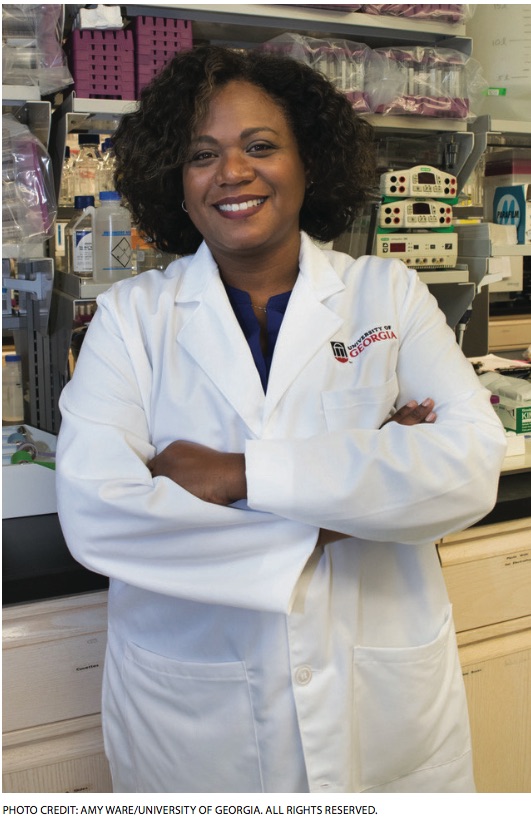
“When I was growing up, my room was full of jars of things like tadpoles, beetles, spiders, and snakes. I would go out and catch whatever I could find, observe the animals for a few weeks and then let them go. I was always just fascinated by how things in the natural world operated. Thankfully, even though my parents didn't particularly like having these creatures in the house – my mother in particular was terrified of snakes – they always allowed me to do my thing. In addition to all of the bugs, I had lots of pets and was always rescuing strays, so I had quite a few dogs, cats, hamsters, and rabbits. Again, my parents weren't too keen on this, but in spite of their personal preferences, they always managed to nurture my love of the natural world.”
This innate love of nature, fascination with animals, and naturally inquisitive mind would eventually lead her to enrol in the [then] newly formed UWI School of Veterinary Medicine (UWI-SVM).
“I think I started saying I wanted to be a vet since I was like seven years old,” says Professor Ferguson-Noel. However, the decision to study veterinary medicine was not one that she took lightly. “A lot of people think that just because you love animals you should be a vet, but it's definitely not all about dealing with cute animals all day long. Many people don't realise how challenging and, frankly, gross it can be to be a vet. You are going to be dealing with sick animals after all.”
After much deliberation and some encouragement from her parents to at least “give vet medicine a try”, she ended up joining the UWI-SVM and became part of what would be one of the programme's smallest cohorts. “I think there were only six people in my year,” she recalls, “and I was one of the youngest students in the group.”
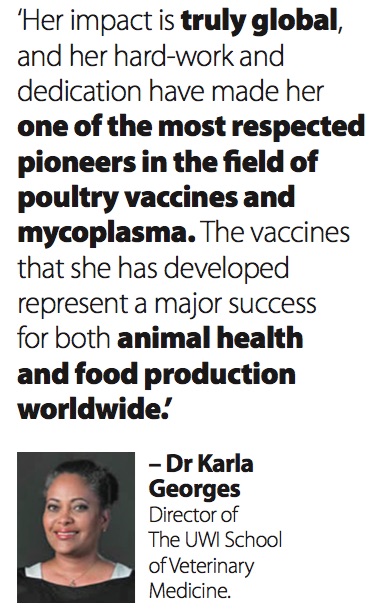
“My experience at UWI was great and has really served me well in the long run,” she says. “There was always a lot of one-on-one attention, and the professors were always open to talking to you and helping out. From day one, the programme also taught us how to talk about our area of study, which is not something that comes naturally. Writing about it is one thing, but being able to verbalise your research and be confident about what you are saying is an extremely difficult thing to do. This confidence that I garnered from my time at UWI has helped me immeasurably in my career today, especially with regards to my research on mycoplasma here at the University of Georgia.
“After I graduated from UWI I began to work under a veterinarian, but I really didn't like working as a practising vet. The vet whom I was working with suggested that I look into avian medicine as he thought it might be an interesting field for me,” she recalls.
This interest was further deepened through her contact with Dr Gabriel Brown, a lecturer on the subject at the UWI-SVM. “Dr Brown was the one who suggested different masters’ programmes to me, and the best one was at the University of Georgia. Once again, I was lucky to have very supportive parents who were on board with this move.”
The decision to leave home was not an easy one for Professor Ferguson-Noel. “I was always a homebody and I really didn't want to leave Trinidad, but one day my dad told me I 'should just go and do the programme. Trinidad will always be here,' he said, 'you can't just think of yourself as a citizen of Trinidad, you have to think of yourself as a citizen of the world.'
“So I got on a plane, came to Georgia without knowing anybody, rented a car at the airport and drove to the university to begin my new journey.” In spite of the amazing opportunities that studying in Georgia would present, it was a difficult transition and she jokes that her professors told her that she was the most homesick student that they ever had! “These were the days before cell phones after all, and long distance calls were very expensive. It was tough, but I survived and it really was an excellent programme. People also tend to have a certain negative image of the South, but I found everybody to be very nice and welcoming, and had a great experience. After completing my master’s in Avian Medicine I went on to then start a PhD in Medical Microbiology where I specialised in mycoplasma research.”
Mycoplasma is a respiratory disease which affects many species including poultry. “It is a bacteria that is very difficult to treat and very difficult to control,” explains Professor Ferguson-Noel. “Mycoplasma strains are naturally resistant to many antibiotics and tend to be chronic. In the poultry industry, a lot of antibiotics are being used around the world to treat mycoplasma infections, but part of my goal is to develop alternate methods so we can reduce this dependence on antibiotics. This is why most of my research has been on the development of mycoplasma vaccines.”
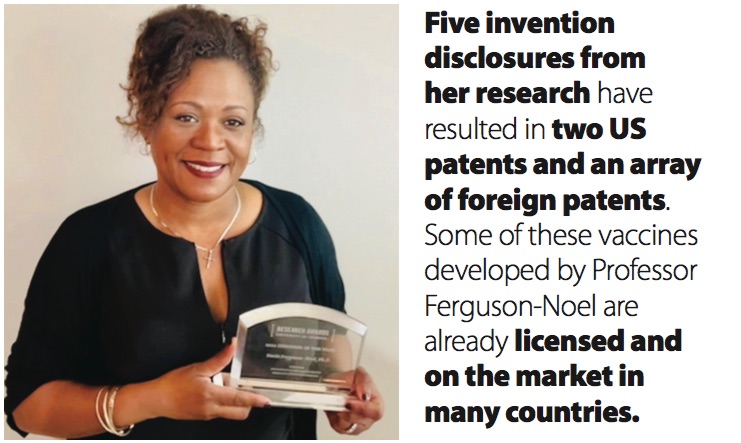
This research on mycoplasma has recently earned her the prestigious Inventor of the Year Award from the University of Georgia. Five invention disclosures from her research have resulted in two US patents and an array of foreign patents. Some of these vaccines developed by Professor Ferguson-Noel are already licensed and on the market in many countries.
Commenting on Professor Ferguson-Noel's success, Dr Karla Georges, Director of UWI-SVM, says, “It's truly mind-boggling what [she] has accomplished, and it is a massive achievement for the University of Georgia and, by extension, The UWI where she began her career. She is now somebody who is known worldwide in the field, and has managed to put Trinidad and Tobago on the map in the world of mycoplasma research. Her impact is truly global, and her hard-work and dedication have made her one of the most respected pioneers in the field of poultry vaccines and mycoplasma. The vaccines that she has developed represent a major success for both animal health and food production worldwide.”
Both Professor Ferguson-Noel and Dr Georges credit their time at UWI as a major factor for their success, and agree that the small class sizes and personal interaction between the professors and students is one of the major appeals of the university.
“Everybody here knows you by name. Here at the UWI-SVM, you aren't just a number on a page or a blank face in a classroom, and we tend to get to know the students quite personally. Of course, this can sometimes be tough, and it might feel like you are always being scrutinised, but in the end, it helps you to progress through the programme more easily. We even try to help you on an individual level if there are ever any administrative problems that crop up, and try our best to intervene and get stuff sorted out. You will never be left to just fend for yourself,” says Dr Georges.
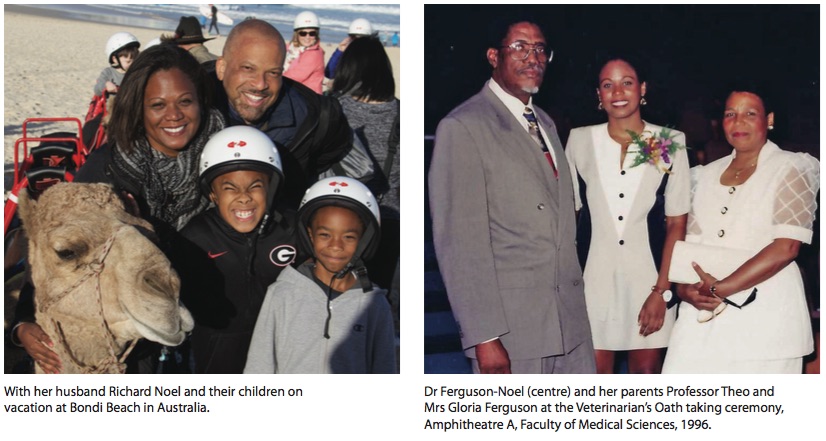
That the UWI-SVM is located in the Caribbean is another reason for prospective students to consider studying here. “Another benefit of studying here at UWI,” adds Dr Georges, “is that we are in a tropical environment and can offer so much experiential learning opportunities with the vast diversity of different species that are found here in Trinidad and Tobago.”
Dr Georges also speaks about the high level of achievement of many of the programme's graduates. “Most of our alumni are in positions of influence and are represented in all of the relevant administrative divisions throughout the Caribbean.” Professor Ferguson-Noel, of course, is one such among the UWI-SVM's alumni in positions of influence.
However, like a true Trini, it's not all about work for her. As much as she loves what she does, Professor Ferguson-Noel knows how to leave room for fun outside the lab. As Dr Georges can confirm, “Naola was always an open, friendly, caring person. She was also very well-rounded and fun-loving. She definitely wasn't just a bookworm who only focused on her studies, but always knew how to have a good time as well. All of us students had a lot of fun together, and there were a lot of parties, Carnivals, and trips to Tobago together. We always made time to lime!”
Professor Ferguson-Noel currently lives in Georgia with her husband Dr Richard Noel who is a practising veterinarian, and her two teenage sons. She continues to make important developments with global impact, and credits her success to the support of her family.
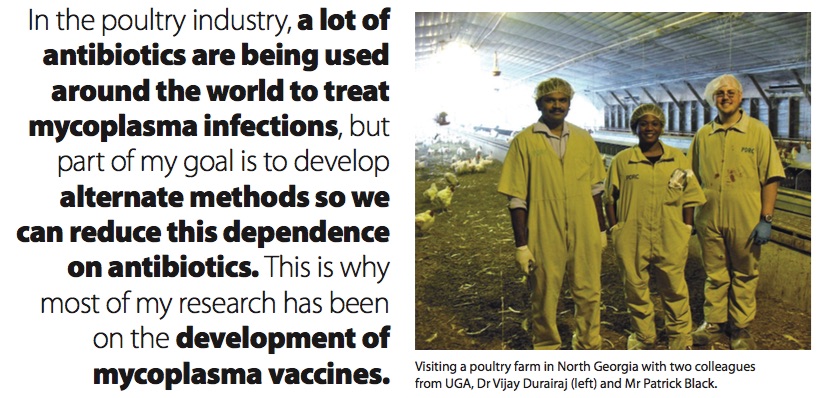
“Nobody does this on their own,” she says, “and I think I am lucky to have had very open-minded, understanding, and supportive parents. They never made me feel like anything I wanted to do was impossible or crazy. There were also so many professors and teachers who opened up my mind to the different possibilities within this field. I don't even want to start naming people because there are so many who have helped me along the way.”
Her advice to students who are currently studying or considering studying veterinary medicine is this:
“Expand your mind as to where you can go. A lot of people tend to associate vets with dogs, cats, horses, and cows – and that's absolutely fine – but there is a very broad diversity of careers in veterinary medicine. There are UWI graduates and SVM graduates everywhere who are doing fantastic work all the time in many different fields. You never know where life will take you.”